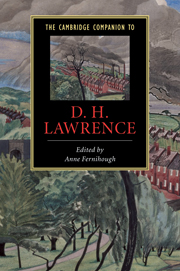Book contents
- Frontmatter
- Introduction
- Part 1 Texts
- Part 2 Contexts and critical issues
- 9 The biographical issue: lives of Lawrence
- 10 Lawrence and modernism
- 11 Lawrence and the politics of sexual politics
- 12 Lawrence and psychoanalysis
- 13 Apocalypse now (and then). Or, D. H. Lawrence and the swan in the electron
- 14 Post-mortem: Lawrence’s critical and cultural legacy
- Guide to further reading
- Index
10 - Lawrence and modernism
from Part 2 - Contexts and critical issues
Published online by Cambridge University Press: 28 May 2006
- Frontmatter
- Introduction
- Part 1 Texts
- Part 2 Contexts and critical issues
- 9 The biographical issue: lives of Lawrence
- 10 Lawrence and modernism
- 11 Lawrence and the politics of sexual politics
- 12 Lawrence and psychoanalysis
- 13 Apocalypse now (and then). Or, D. H. Lawrence and the swan in the electron
- 14 Post-mortem: Lawrence’s critical and cultural legacy
- Guide to further reading
- Index
Summary
The word 'modernism' raises two immediate problems. It usually refers not to modern literary consciousness at large but to the more specific and selfconscious avant-garde movements associated with such writers as Ezra Pound, T. S. Eliot, James Joyce, Wyndham Lewis and Virginia Woolf. Furthermore, even these writers had different, sometimes competing, conceptions which are still a matter of controversy. Yet there is a distinctive set of cultural and artistic concerns shared by these writers and Lawrence stands in a peculiarly significant relation to them. He is usually seen as being at best marginal to the modernism which these figures came largely to define, and they were almost uniformly hostile or condescending to him. But once it is properly understood, his apparently marginal position becomes critically central. For Lawrence provided then, and still provides, one of the most significant critiques of modernism arising from the same historical context and concerns.
- Type
- Chapter
- Information
- The Cambridge Companion to D. H. Lawrence , pp. 179 - 196Publisher: Cambridge University PressPrint publication year: 2001
- 2
- Cited by



